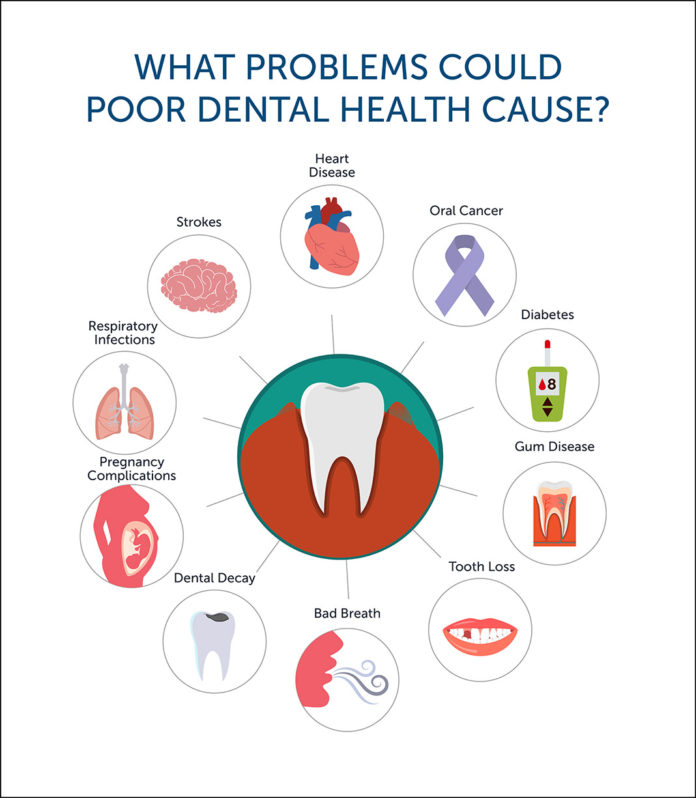The relationship between one’s oral and overall health has been increasingly recognized during the past two decades. Mouth is the entry point of many bacteria that can go into the body. Oral infections can be potential contributing factors to a variety of clinically important diseases, such as cardiovascular disease, bacterial pneumonia, neurologic stroke, diabetes mellitus, low birth weights and oral cancers.
The disease causing bacteria found in the periodontal (gum) tissue or infected tooth can travel throughout the body via the blood stream. These microbial toxins causes tissue trauma depending on the host’s susceptibility.
Cardiovascular Disease:
Apart from other possible risk factors, chronic oral infection and inflammation can also be linked with cardiovascular disease. Poor oral hygiene and chronic periodontal disease (gum disease) can lead to cardiovascular disease through direct or indirect effects of oral bacteria. The most worrisome is Infective endocarditis apart from myocardial infarction. Bacteria can gain access through inflamed and infected periodontal tissue into the systemic circulation & adhere to heart values or heart surface by formation of thrombus.
Neurogenic Stroke:
The inflamed periodontium (gum tissue) releases certain chemicals and bacteria into the blood. Deposition of these bacteria into the blood vessels, damaging its wall and leading to plaque formation may lead to either total or partial blockage of main artery supplying the brain resulting in a cerebrovascular event commonly called as stroke.
Bacterial Pneumonia:
Pneumonia is the infection of the lung tissues it may be due to bacteria, fungus and viruses. Poor oral hygiene, inflamed infected gums increases the plaque load resulting in increased colonization of pathogenic bacteria. Some studies suggest that an important association exist between poor periodontal status and aspiration pneumonia. Certain bacteria can colonize in oral cavity and be aspirated into the lower airways and cause pneumonia. It is usually in cases of diabetic patients.
Pregnancy and Oral Disease:
Pregnancy, oral contraception pills can influence gingival health. Changes in hormone levels during pregnancy can lead to pregnancy gingivitis and increase dental plaque levels. There are numerous studies in scientific literature which concludes that women who have severe gum disease during pregnancy may be more likely to give birth to preterm low birth weight babies than mothers with healthy oral conditions.
Diabetes:
People with diabetes are more likely to develop severe gum disease, tooth decay, dry mouth and infection. There is a possibility that periodontal disease either predisposes or exacerbates the diabetic condition. Diabetes and periodontal disease or infection has a two way relationship.
Oral Cancer:
It is accepted now in our country that habit of chewing pan, tobacco, supari and smoking leads to poor oral hygiene and sharp teeth. These can cause ulceration of tongue, buccal mucosa or around the jaws leading to malignant changes. Avoiding the habits and going for regular dental evaluation can prevent the oral cancers. Lastly infected gums and teeth will result in teeth loss and an edentulous person will have various nutritional deficiency and possible systemic illness.
Brushing and flossing regularly, regular dental checkup and professional cleaning is the key to prevent. Dental care and oral health play a key role in helping to ensure the overall good health of the body. Your mouth talks to your body and your body talks to your mouth.


























